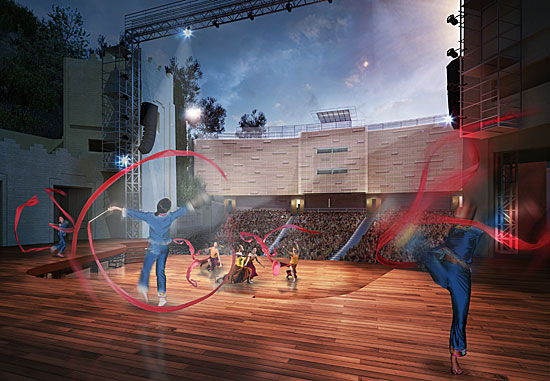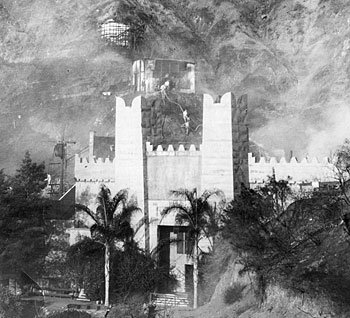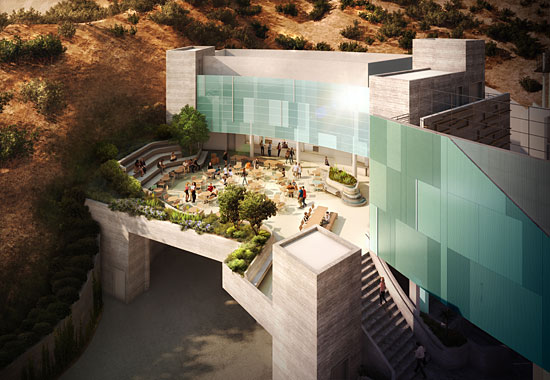
A view from the Ford’s new stage shows performers’ perspective. Image/Levin & Associates
With environmental approval this week of a transformative plan for the county’s John Anson Ford Theatres, the historic hillside facility is poised to stage its biggest comeback act since a fire wiped it out early in the last century.
Just as the current Ford rose from the ashes of that 1929 blaze, the revamped amphitheatre is expected to retain its historic charms while being modernized and reimagined to serve new generations of concert-goers.
In approving the environmental impact report for the Ford on Tuesday, the Board of Supervisors did not appropriate any funding for the project, which is intended to be built in phases.
However, thanks to previous appropriations from the 3rd Supervisorial District and the county, money already is in place to achieve one of the master plan’s most ambitious components: completing all restoration work and improvements involving the amphitheatre itself.
The facility will close throughout 2015 in order to replace the outdated and unevenly-surfaced stage, modernize the decrepit backstage area, upgrade aging electrical and audio-visual systems, improve accessibility and reengineer the site’s scenic but mudslide-prone hillside.

The original Ford was destroyed in this October 24, 1929 brushfire. Photo/Herald Examiner Collection, L.A. Public Library
In addition, with $28.5 million in additional funding recently approved as part of the county’s supplemental budget, the scope of the construction has broadened to include soundwalls to buffer the noise from the 101 Freeway, an expansive terrace where up to 200 people can enjoy pre-concert picnics, and a two-level structure with a new concession area on the first floor and offices for the Ford staff above.
“By combining the previously approved work with the new projects, we will be able to save several millions of dollars in construction costs,” said Laura Zucker, executive director of the Los Angeles County Arts Commission, which operates the Ford.
The current work—including earlier phases that involved developing the master plan and environmental impact report, replacing the amphitheatre’s seats and stripping away yellow paint to reveal its original concrete surface—has a total price tag of nearly $56.6 million.
Still to come in future years, once funding is identified, are a transportation plaza with a three-level parking garage, a restaurant, a 299-seat theatre and a ¾ mile-long hiking trail with majestic views of the Hollywood sign and other vistas.
Beyond new amenities, the work will address some longstanding problems that have plagued the 1,200-seat amphitheatre.
“It’s literally had mudslides going through it,” said Adam Davis, the Ford’s managing director of productions. “It’s kind of been neglected and this project is really going to help.”
The project’s architect, Brenda Levin, whose historic preservation work includes acclaimed projects at the Griffith Observatory, Wilshire Boulevard Temple and Dodger Stadium, said it is impossible to separate the Ford from its unique natural setting on county parkland in the Cahuenga Pass.
“The building itself is set deep into a canyon, and the canyon is very much part of the theatrical experience,” Levin said. “At the Ford you’re focused on the natural landscape, which will be maintained.”
By the time all the work described in the master plan is concluded, the public is likely to see the Ford and its surroundings in a dramatically different light, she said.
“I don’t think at this point that many people would describe the Ford as sitting in the middle of a 32-acre park,” Levin said. “I do think after this project is complete, they will totally understand that.”
Supervisor Zev Yaroslavsky, a longtime backer of the facility since he was elected to the county Board of Supervisors in 1994, said the coming work will be a game-changer for the Ford. “During my tenure we have continually made incremental improvements, but this really takes it to the next level,” he said. Yaroslavsky, who is retiring from the Board of Supervisors later this year, predicted that when the amphitheatre reopens in the summer of 2016, patrons will be in for their “best-ever Ford Theatres experience.”
Over the past two decades, the Ford has forged a unique identity among Los Angeles concert venues through its “partnership program” showcasing local artists, and more recently with its annual “Zev Yaroslavsky Signature Series” that aims to draw new audiences with programming pairing nationally known performers with homegrown talent.
With the Ford closing for construction next summer, plans are underway to bring a series of performances into various communities around the county.

A new terrace will invite pre-concert picnicking. Image/Levin & Associates
Posted 10/8/14






